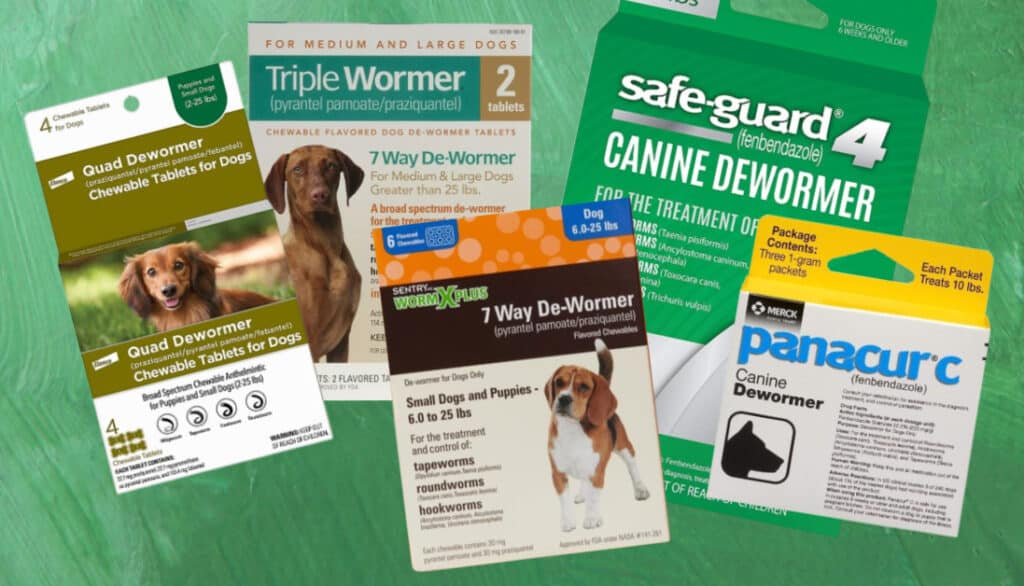As a fellow animal lover, I know just how much our furry friends mean to us. They’re more than just pets—they’re part of our families. And just like with any family member, their health is a top priority. That’s why today, we’re tackling an interesting topic that has been making rounds in various pet forums and vet office conversations: Can you use cat dewormer on dogs? And if you can, is it safe? The short answer is no.
Now, if you’ve ever owned both cats and dogs, you might have pondered this question yourself. After all, the convenience of using the same product for multiple pets is quite appealing, especially when you’re juggling the responsibilities of modern life. However, when it comes to our pets’ health, it’s crucial that we base our actions on accurate information, not just convenience.
In this blog, we’re going to delve deep into this question, exploring the world of pet dewormers, understanding their differences, and discovering whether it’s safe or not to cross-use products intended for our feline friends on our canine companions. So, buckle up and get ready for some knowledge that could potentially save you a trip to the vet, and most importantly, safeguard the health of your precious pooch.
Remember, our ultimate goal here is to ensure our pets live the happiest, healthiest lives possible. So, let’s dive in!

Understanding Worms in Pets
Alright, my fellow pet parents, let’s dive a bit deeper into the world of our furry friends, specifically, their battle with those pesky parasites—worms.
First off, it’s important to remember that worms in pets are not just gross to think about, but they can also cause some serious health issues. No one likes the idea of their furbaby being uncomfortable or sick, right? So let’s arm ourselves with knowledge to keep those nasty critters at bay!
There are several types of worms that commonly affect our pets. Each of these nasty pests comes with its own set of symptoms and potential health problems. Here are the main culprits:
- Roundworms: These are the most common worms in both cats and dogs. They’re spaghetti-like creatures that live in your pet’s intestines, causing symptoms like diarrhea, vomiting, weight loss, and a potbelly appearance. Yuck!
- Hookworms: These tiny, yet formidable foes can cause serious damage to your pet’s intestines leading to anemia, weight loss, and in severe cases, death, particularly in puppies and kittens.
- Tapeworms: You might spot segments of these pests in your pet’s stool or around their rear end. Often contracted from fleas or consuming prey like rodents, tapeworms can cause weight loss and mild irritation.
- Whipworms: More common in dogs than cats, these worms can lead to chronic weight loss, diarrhea, and other serious health problems.
These creepy crawlies might all sound similar, but each requires a different treatment, which is why it’s important to have your pet diagnosed accurately by a vet if you suspect they have worms. Remember, these are not just nuisances; a severe worm infestation can lead to serious health problems, even life-threatening situations, especially in young or immunocompromised pets.
Regular deworming of our pets, following the guidelines of our trusty vets, can keep these unwelcome guests away. But the question remains: Can we use the same dewormer for our cats and dogs? Let’s move on and explore this question together.

Comparing Dewormers for Cats and Dogs
Let’s dive into the weaponry we use against pesky pet parasites: dewormers. These medicines, available as tablets, granules, or liquids, eliminate worms by paralyzing them or disrupting their metabolism, much like a micro-SWAT team in your pet’s digestive system.
While dewormers for dogs and cats might seem identical, they are indeed distinct. The differentiation lies primarily in the active ingredients. Dog dewormers often contain fenbendazole, praziquantel, or pyrantel pamoate, while cat dewormers usually incorporate praziquantel and epsiprantel. These ingredients are designed to tackle specific worms and are dosed differently for each pet.
Moreover, some dewormers are ‘broad-spectrum’, targeting various worms, while others are ‘specific’, designed to combat one or two types of worms. The selection of dewormer depends on the type of worm and your pet’s overall health.
Remember, despite the love we have for our pets, cats are not miniature dogs. They possess different metabolic rates, body structures, and health needs. Therefore, cat and dog dewormers are formulated uniquely, emphasizing the caution needed when contemplating using one in place of the other.

Risks and Concerns Using Cat Dewormer for Dogs
As pet parents, we might wonder if using a cat dewormer for our dogs is a viable option. However, caution is needed here. Dogs and cats metabolize drugs differently, meaning dosages safe for cats could harm dogs or vice versa. Using cat dewormer for dogs risks incorrect dosage, potentially leading to serious side effects like vomiting, tremors, and even organ damage.
Additionally, each dewormer is designed for specific worms. Using the wrong one could mean ineffective treatment, allowing worms to continue harming your dog. Even the inactive ingredients in cat dewormers might be unsuitable for dogs, despite being safe for cats.
While it may seem convenient and budget-friendly to use the same dewormer for both pets, this decision could lead to grave outcomes. When it comes to our pets’ health, it’s safer to seek professional guidance. Let’s discuss safe practices for dog deworming next.

Safe Practices for Deworming Your Dog
Ok, fellow dog lovers, we’ve covered the what and the why, now let’s talk about the how. How can we safely deworm our beloved canine companions?
First and foremost, the golden rule of pet care is always to consult your vet before administering any medication, and dewormers are no exception. Each dog is unique, and what works for one might not work for another. Your vet can give you the best advice based on your dog’s breed, size, age, and overall health condition.
The second point to remember is to always use dewormers designed specifically for dogs. As we’ve learned, cat dewormers are not suitable substitutes. The potential risks far outweigh any perceived convenience or cost-effectiveness.
But what kind of dog dewormer should you use? Well, that depends on the type of worms your dog is dealing with. Broad-spectrum dewormers are a common choice because they can tackle a range of worms. However, your vet might recommend a specific dewormer if your dog is dealing with a particular worm infestation.
Now, about the deworming schedule. Puppies should be dewormed every two weeks from two weeks of age until they are twelve weeks old, then monthly until they are six months old. After that, your dog should be dewormed at least twice a year. However, the schedule can vary depending on your dog’s lifestyle, diet, and the area where you live.
I know this might seem like a lot to remember, but keeping your pet healthy is a big responsibility, and you’re more than capable! With the right knowledge and guidance from your vet, you can make sure your four-legged friend is worm-free and ready for all the tail-wagging adventures that lie ahead.

Over The Counter Brands of Dog Dewormers
Alrighty, my fellow dog devotees! We’ve talked about what to do, and now let’s get into some of the products that can help us do it. Specifically, let’s talk about some popular over-the-counter (OTC) brands of dog dewormers and what they’re used for.
- Bayer Quad Dewormer: This is a broad-spectrum dewormer that tackles four types of worms: tapeworms, roundworms, hookworms, and whipworms. It’s a chewable tablet, making administration easier. Just make sure you choose the right product based on your dog’s weight.
- Sentry HC WormX Plus: This product is designed to treat and control seven strains of worms, including two types of tapeworms, two types of roundworms, and three types of hookworms. It comes in a chewable form, and it’s suitable for small dogs and puppies over 12 weeks of age.
- Durvet Triple Wormer: This broad-spectrum dewormer eliminates seven types of worms, including tapeworms, roundworms, and hookworms. The chewable flavored tablets are a bonus if you have a fussy eater!
- Excel Safe-Guard Canine Dewormer: Excel Safe-Guard is designed to tackle roundworms, hookworms, whipworms, and tapeworms. It’s unique because it’s administered over three consecutive days, which can be more effective for stubborn infestations.
- Panacur C Canine Dewormer: This product targets a variety of worms, including roundworms, hookworms, whipworms, and certain types of tapeworms. It’s a powder that you mix with your dog’s food, making it a good option for dogs that are picky about pills.
Remember, these are just a few of the OTC options available. There are many other brands and formulations out there, so it’s important to find the one that’s right for your pet. And, of course, make sure to consult your vet before starting any new medication. They can guide you on the right product and dosage for your pooch.
With the right knowledge and tools, we can help ensure our furry friends lead happy, healthy, and worm-free lives. Now, isn’t that a tail-wagging thought?

Conclusion
And there you have it, fellow pet lovers! We’ve journeyed together through the somewhat grim but incredibly important world of worms and dewormers, explored the differences between cat and dog dewormers, and dug deep into the potential risks of cross-using these medications.
The bottom line? While we all love a good life hack, using cat dewormer for dogs is a shortcut we should never take. Remember, convenience should never come before the health and safety of our pets. After all, they rely on us to make the best choices for them—and that includes the right deworming medication.
We’ve also looked into some of the popular OTC dewormers for dogs. But remember, before you head off to the pet store or add an item to your online shopping cart, always consult with your vet. They can provide personalized advice based on your dog’s unique needs and circumstances.
Our journey as pet parents is filled with countless tail wags, wet nose nudges, and yes, a few challenges. But with a little knowledge and a whole lot of love, we can ensure our four-legged friends enjoy the happy, healthy lives they deserve.
Stay informed, keep loving your pets, and always remember, we’re in this together! Now go give your furry friend a belly rub for me, and let’s meet again soon for another pet-loving chat!
~ Sheena
Frequently Asked Questions
A: While it might seem like a convenient solution, cat dewormer should not be used on dogs. Cats and dogs have different metabolisms and health needs, so what’s safe and effective for one may not be for the other.
A: Using cat dewormer for dogs can lead to underdosing or overdosing, neither of which are beneficial. Underdosing may not effectively kill the worms, while overdosing can lead to harmful side effects such as vomiting, tremors, and potentially organ damage.
A: Yes, several types of worms, including roundworms, hookworms, and tapeworms, can infect both cats and dogs. However, the treatment and prevention methods may differ between the two species.
A: Puppies should be dewormed every two weeks from two weeks of age until they are twelve weeks old, then monthly until they are six months old. Adult dogs should generally be dewormed at least twice a year, but the frequency can vary depending on your dog’s lifestyle, diet, and the area where you live. Always consult with your vet for the best deworming schedule for your pet.
A: Yes, there are several effective over-the-counter dewormers for dogs. Popular brands include Bayer Quad Dewormer, Sentry HC WormX Plus, Durvet Triple Wormer, Excel Safe-Guard Canine Dewormer, and Panacur C Canine Dewormer. Always choose a product based on your dog’s weight and specific needs.
A: While most dogs tolerate dewormers well, some can experience side effects like vomiting, diarrhea, loss of appetite, or lethargy. If your dog shows any adverse reactions after taking a dewormer, it’s crucial to contact your vet immediately.
A: Maintaining a regular deworming schedule is a key step in preventing worm infestations. Additionally, regular vet check-ups, proper hygiene, a balanced diet, and preventing your dog from eating raw meat or scavenging can also reduce the risk of worm infestations.
